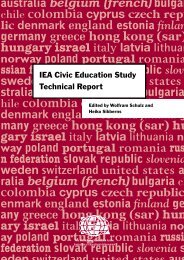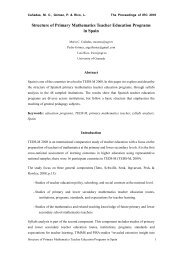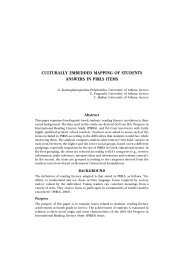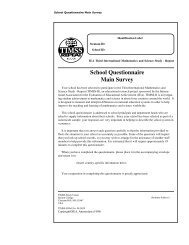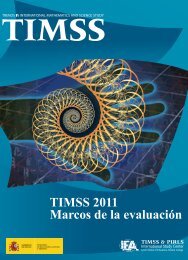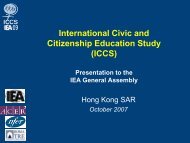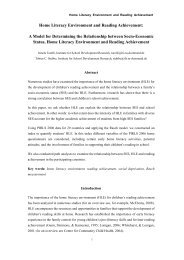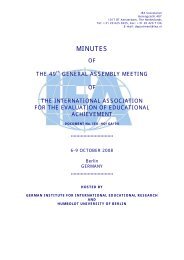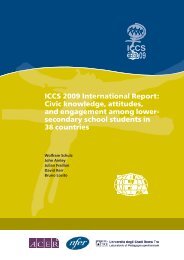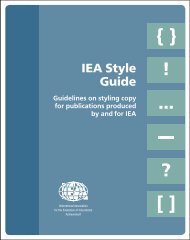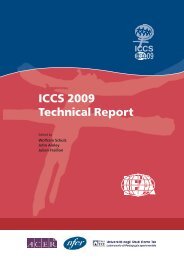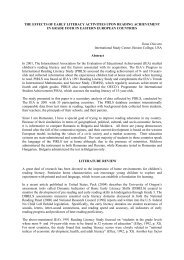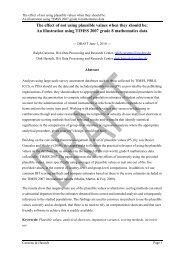International civic and citizenship education study - iccs - IEA
International civic and citizenship education study - iccs - IEA
International civic and citizenship education study - iccs - IEA
- TAGS
- civic
- citizenship
- iccs
- www.iea.nl
You also want an ePaper? Increase the reach of your titles
YUMPU automatically turns print PDFs into web optimized ePapers that Google loves.
Reporting on the contextual scales<br />
ICCS will report outcomes of <strong>civic</strong> <strong>and</strong> <strong>citizenship</strong> <strong>education</strong> on a number of international<br />
scales derived from the student test <strong>and</strong> the student questionnaire.<br />
The cognitive test items will be scaled to obtain scores of <strong>civic</strong> knowledge <strong>and</strong> underst<strong>and</strong>ing.<br />
The scale will cover student knowledge <strong>and</strong> underst<strong>and</strong>ing with regard to the four content<br />
domains <strong>and</strong> the two cognitive domains. Items will be used to describe student knowledge <strong>and</strong><br />
underst<strong>and</strong>ings at different levels of student proficiency.<br />
The student questionnaire includes items that are used to obtain the following scales reflecting<br />
students’ value beliefs:<br />
• Students’ support for democratic value beliefs<br />
• Students’ support for the importance of conventional <strong>citizenship</strong><br />
• Students’ support for the importance of social-movement related <strong>citizenship</strong>.<br />
The student questionnaire includes items that are used to obtain scales reflecting the following<br />
attitudes:<br />
• Students’ interest in political <strong>and</strong> social issues<br />
• Students’ <strong>civic</strong> self-concept<br />
• Students’ support for equal gender rights <strong>and</strong> responsibilities<br />
• Students’ support for equal rights for ethnic/racial groups<br />
• Students’ support for equal rights for immigrants<br />
• Students’ confidence in school-based participation<br />
• Students’ trust in government-related institutions<br />
• Students’ sense of <strong>citizenship</strong> self-efficacy<br />
• Students’ attitudes toward their country.<br />
The student questionnaire includes items that are used to obtain scales reflecting the following<br />
behavioral intentions:<br />
• Students’ expectations to participate in legal protest activities<br />
• Students’ expectations to participate in illegal protest activities<br />
• Students’ expectations to participate in elections<br />
• Students’ expectations to engage in active political participation<br />
• Students’ expectations to participate in informal political participation.<br />
The student questionnaire includes items that are used to obtain scales reflecting the following<br />
behaviors:<br />
• Students’ reports of <strong>civic</strong> participation outside of school<br />
• Students’ reports of <strong>civic</strong> participation at school.<br />
Additional scales reflecting contextual factors are derived from the student, teacher, <strong>and</strong><br />
school questionnaires. These scales are designed to describe the learning context for <strong>civic</strong> <strong>and</strong><br />
<strong>citizenship</strong> <strong>education</strong> <strong>and</strong> to explain variation in learning outcomes.<br />
ICCS ASSeSSment FrAmework<br />
49



